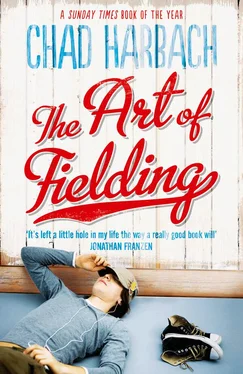1 ...6 7 8 10 11 12 ...27 Instead of sinking and dissolving, the powder floated on the milk’s surface in a stubborn pile. Henry found a fork in his desk drawer and began to stir, but the powder cocooned around the tines. He beat at it faster and faster. The fork clanged against the cup. “Maybe you could do that elsewhere,” Owen suggested. “Or not at all.”
Henry stopped stirring and lifted the cup to his lips. He intended to down it in one gulp, but the sludgy mixture seemed to leaven in his stomach. When he set down the cup it was still almost full. “Can you see my body’s potential being unlocked?”
Owen put on his glasses. “You’re turning a little green,” he said. “Maybe that’s an intermediate step.”
Two months later, when tryouts began, Henry didn’t look much bigger in the mirror, but at least he didn’t throw up anymore, and the weights he lifted were slightly less small. He arrived at the locker room an hour early. Two of his potential future teammates were already there. Schwartz sat shirtless in front of his locker, hunched over a thick textbook. In the corner, smoothing a pair of slacks on a hanger —
“Owen!” Henry was shocked. “What are you doing here?”
Owen looked at him as if he were daft. “Baseball tryouts begin today.”
“I know, but —”
Coach Cox appeared in the doorway. He was Henry’s height but thick-chested, with a strong square jaw in which he ground a wad of gum. He wore track pants and a Westish Baseball sweatshirt. “Schwartz,” he said gruffly as he stroked his clipped black mustache, “how are those knees?”
“Not bad, Coach.” Schwartz stood up to greet Coach Cox with a combination handshake-hug. “I want you to meet Henry Skrimshander.”
“Skrimshander.” Coach Cox nodded as he wrung Henry’s hand in a painful grip. “Schwartz tells me you plan to give Tennant a run for his money.”
Lev Tennant, a senior, was the starting shortstop and team cocaptain. Schwartz kept telling Henry he could beat him out—it had become a kind of mantra for their evening workouts. “Tennant!” Schwartz would yell as he leaned over Henry, dripping sweat into Henry’s open mouth while Henry struggled with the skullcrusher bar. “Beat out Tennant!” Henry didn’t know how Schwartz could sweat so much when he wasn’t even lifting, and he certainly didn’t know how he was supposed to beat out Tennant. He’d seen the smooth, sharklike way Tennant moved around campus, devouring girls’ smiles. “I’ll do my best, sir,” Henry said now.
“See that you do.” Coach Cox turned to Owen, extended a hand. “Ron Cox.”
“Owen Dunne,” Owen said. “Right fielder. I trust you don’t object to having a gay man on your team.”
“The only thing I object to,” Coach Cox replied, “is Schwartz playing football. It’s bad for his knees.”
Tryouts would take place inside the VAC, but first Coach Cox ordered the assembled crowd out into the cold. “A little roadwork,” he instructed them. “Around the lighthouse and back.”
Henry tried to tally up the bodies as they filed outside, but everybody kept shifting around, and anyway he didn’t know how many guys would make the team. He ran faster than he’d ever run and finished the four miles in the first group, alongside a surprisingly nimble Schwartz and behind only Starblind, who’d sped ahead in the first hundred meters and disappeared from view. The second group included most of the team’s established players, including Tennant and Tom Meccini, the captains. Schwartz’s roommate, Demetrius Arsch, who weighed at least 260 and smoked half a pack a day between the end of football season and the beginning of baseball, brought up the rear. At least everyone assumed he’d brought up the rear, until Owen cruised into view.
“Dunne!” Coach Cox bellowed.
“Coach Cox!”
“Where the goddamn hell’ve you been?”
“Doing a little roadwork,” Owen reminded him. “Around the lighthouse and back.”
“You mean to tell me” — Coach Cox planted a hand between the shoulder blades of Arsch, who was bent over, gasping for breath — “that you can’t beat Meat here in a footrace?”
Owen bent down until he and Arsch came face-to-face — Arsch’s damp and fragrantly purple, his own composed and dry. “I bet I could beat him now,” he said. “He looks tired.”
But when batting practice began, Owen knocked one line drive after another back up the middle of the batting cage. Sal Phlox, who was feeding balls into the old-fashioned machine, kept having to duck behind his protective screen. “Get out of there, Dunne,” grumbled Coach Cox. “Before you hurt someone.”
Henry had never taken grounders on artificial turf before; it was like living inside a video game. The ball never hit a rock or the lip of the grass, but the synthetic fibers could impart some wicked spin. In four days of tryouts he didn’t miss a single ball. When the roster was posted, four freshpersons had made the team: Adam Starblind, Rick O’Shea, Owen Dunne, and Henry Skrimshander.
Chapter 5
Six weeks later, the Harpooners strode across the tarmac at the tiny Green Bay airport, wind whipping their faces, WAD-emblazoned bags slung over their shoulders. Everyone but Henry nodded to the beat of his headphones’ music. It was a clear, cold day, the temperature in the twenties, but they were dressed for their destination, no jackets or sweaters allowed. The plane’s propellers pureed the air. Dry week-old snow swept across the runway in windblown sine curves. Henry threw back his shoulders and walked as tall as his five-nine frame would allow, just like every road-tripping athlete he’d ever seen on TV. They were headed to Florida to play baseball, all expenses paid.
They were staying at a Motel 4 an hour inland from the Clearwater Municipal Baseball Complex. The older guys slept two to a bed; the freshpersons slept on cots. Henry was assigned to Schwartz and Arsch’s room. He lay awake the whole first night, listening to Meat’s plane-engine snoring and the tortured cries of the springs as the two sophomores, five hundred pounds between them, battled in their sleep for control of the supposedly queen-size bed. Henry closed his eyes, wrapped the smoky vinyl drapes around his head, and counted the minutes until their first real outdoor practice.
The next morning, a Saturday, they loaded onto the bus and drove to the complex — eight plush and lovely diamonds laid out in adjacent circles of four diamonds each. The dew twinkled in the buttery Florida sunlight. Henry, as he jogged out to short for infield drills, spun and launched into a backflip, staggering only slightly on the landing.
“Damn, Skrim!” yelled Starblind from center field. “Where’d that come from?”
Henry didn’t know. He tried to remember the footwork he’d used, but the moment had passed. Sometimes your body just did what it wanted to.
“You should try out for gymnastics,” Tennant said. “You’re about the right size.”
During batting practice, Henry scaled the left-field fence and stood in the parking lot to shag the amazing moonshots that Two Thirty Toover kept hitting. “Welcome back, Jim,” Coach Cox cheered, as ball after ball soared easily over the wall. “We missed you.”
Mild-eyed Jim Toover had just returned from a Mormon mission to Argentina. Jim was six-six and had a long, powerful swing. They called him Two Thirty because that was when the Harpooners took batting practice before home games. Now Henry was standing thirty feet beyond the fence, and the balls were raining down as if dropped from the clouds. Fans hustled out to the parking lot to move their cars. The teams on adjacent diamonds abandoned their drills to watch.
“But we wouldn’t call him Two Thirty,” Schwartz told Henry, “if he did it during games.”
Читать дальше










